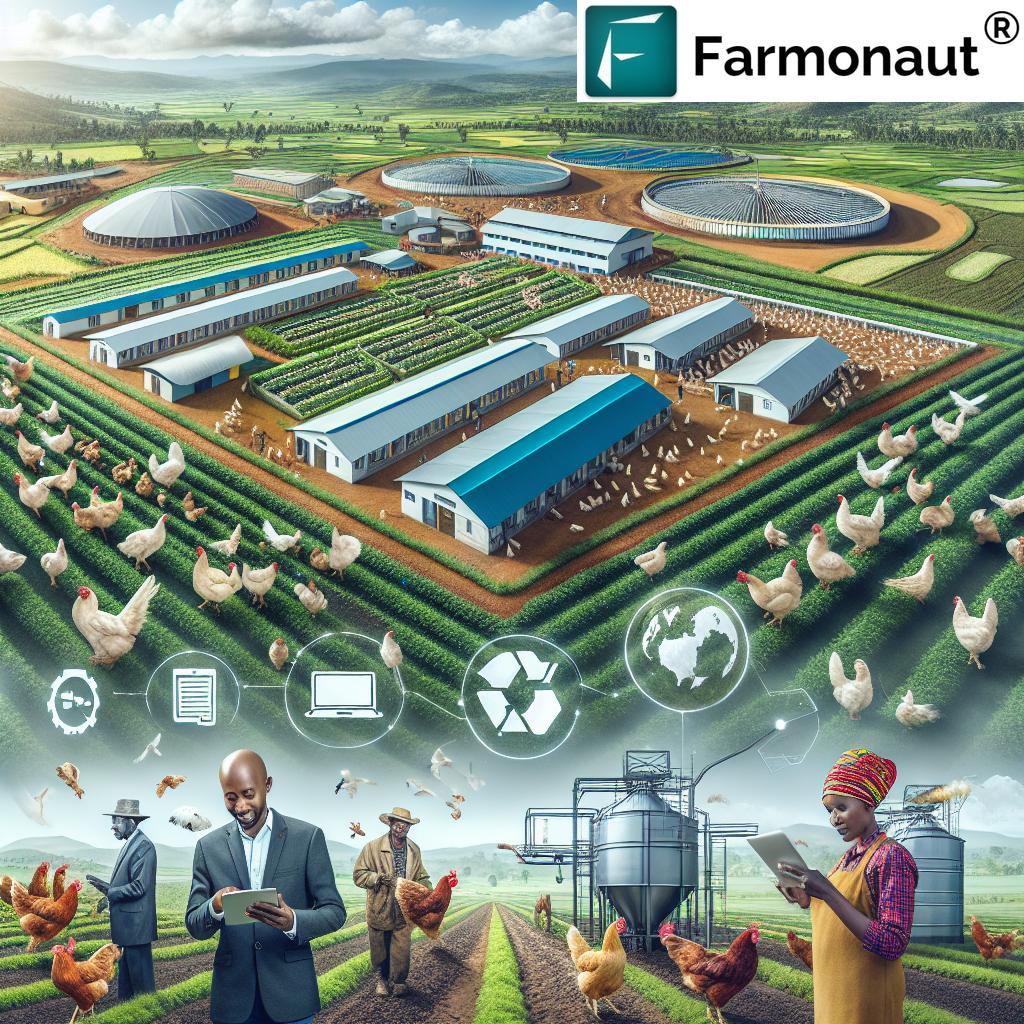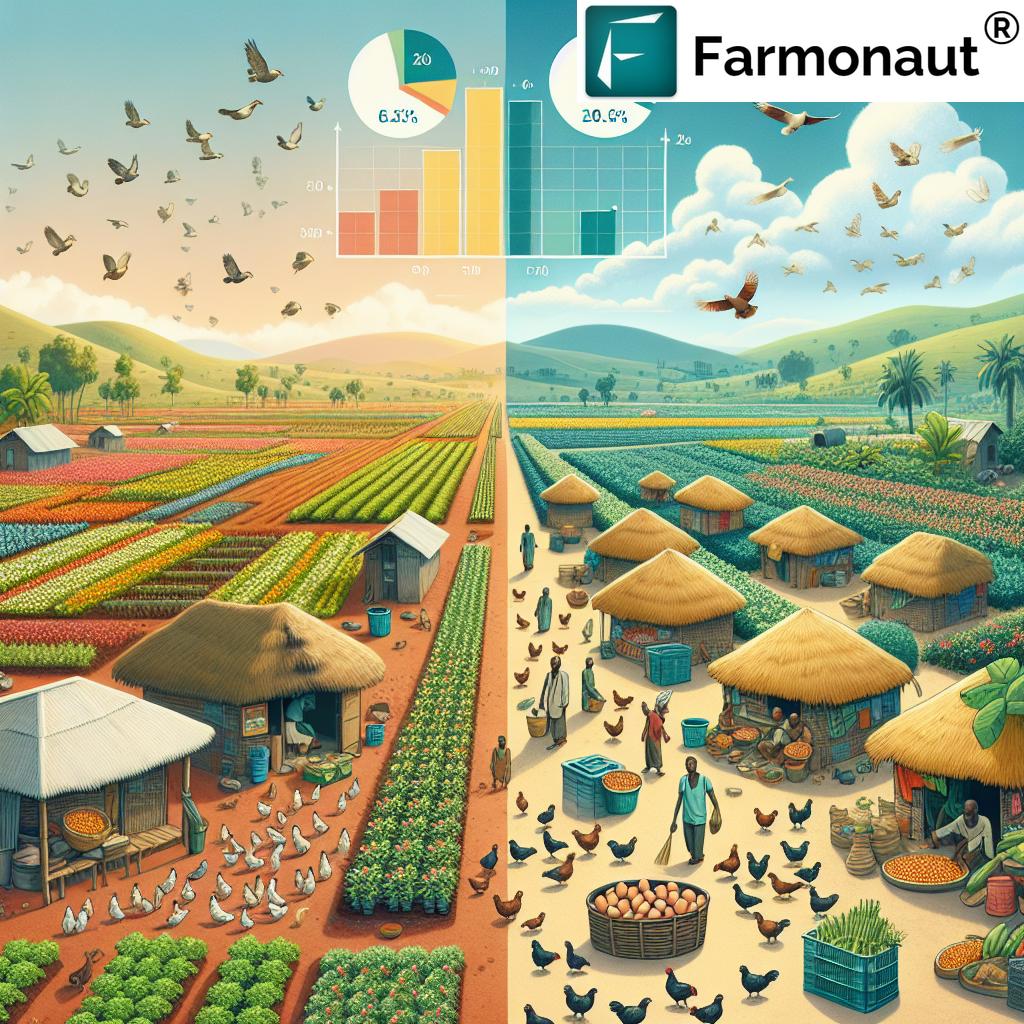Sustainable Agriculture in Ethiopia: Boosting Food Security and Rural Development Through Innovative Poultry Farming
“A $5 million investment in Ethiopian poultry farming aims to boost food security and create agricultural jobs in rural Africa.”
In the heart of Africa, a remarkable transformation is taking place that promises to revolutionize sustainable agriculture in Ethiopia. We’re witnessing a significant boost to food security and rural development through an innovative approach to poultry farming. This blog post delves into the details of this groundbreaking initiative, exploring how a strategic investment is set to change the landscape of Ethiopian agriculture and create a ripple effect across the continent.
The Power of Impact Investing in Agriculture
The global impact fund’s decision to invest $5 million in a leading Ethiopian poultry company marks a pivotal moment in the country’s agricultural sector. This investment is not just about financial returns; it’s a commitment to enhancing food security, reducing poverty, and creating much-needed agricultural jobs in rural Africa. Let’s explore how this investment is set to transform Ethiopia’s agricultural landscape and create a model for impact investing in agriculture across developing nations.

Understanding the Ethiopian Poultry Sector
Ethiopia’s poultry industry plays a crucial role in the country’s agricultural landscape. Traditionally, poultry farming has been a small-scale activity, primarily for household consumption. However, with this new investment, we’re seeing a shift towards more organized and efficient poultry production. This transition is expected to have far-reaching impacts on food security, nutrition, and rural livelihoods.
- Current state of poultry farming in Ethiopia
- Challenges faced by small-scale farmers
- Potential for growth and development in the sector
The $5 Million Investment: A Game-Changer for Ethiopian Agriculture
The substantial investment in Ethiopia’s leading poultry company is set to revolutionize the country’s agricultural sector. This funding is strategically aimed at expanding and enhancing the company’s operations, which span across various crucial areas of poultry production.
- Poultry Farms: Expansion of existing farms and establishment of new ones
- Hatcheries: Modernization and increase in capacity for day-old chicks supply
- Feed Mills: Enhancement of feed production capabilities
By strengthening these key areas, the investment is poised to create a robust and sustainable poultry industry in Ethiopia. This, in turn, will contribute significantly to local livelihoods and bolster the feed supply market.
Impact on Food Security and Nutrition
One of the primary goals of this investment is to enhance food security in Ethiopia. By boosting poultry production, we expect to see a significant increase in the availability of affordable, high-quality protein sources for the local population. This is particularly crucial in a country where malnutrition remains a persistent challenge.
- Increased accessibility to poultry products
- Improvement in dietary diversity
- Potential reduction in malnutrition rates
For those interested in leveraging technology for agricultural improvements, Farmonaut offers innovative solutions. Check out their Web App for cutting-edge farm management tools.

Rural Development and Job Creation
The investment in Ethiopia’s poultry sector is expected to be a significant driver of rural development. By expanding operations and introducing modern farming techniques, this initiative is set to create numerous agricultural jobs across the value chain.
- Direct employment in poultry farms and processing units
- Indirect job creation in supporting industries
- Skills development and capacity building for local farmers
This focus on job creation is crucial in addressing poverty and stimulating economic growth in rural areas of Ethiopia.
Innovative Approaches in Poultry Farming
The investment is not just about expanding existing operations; it’s about introducing innovative approaches to poultry farming in Ethiopia. These innovations are expected to significantly improve productivity and sustainability in the sector.
- Introduction of modern breeding techniques
- Implementation of advanced feed formulation methods
- Adoption of sustainable waste management practices
“EthioChicken’s operations, including poultry farms, hatcheries, and feed mills, contribute to local livelihoods and the feed supply market.”
Enhancing the Feed Supply Market
A critical component of this investment is its impact on the feed supply market. By enhancing feed production capabilities, the initiative is set to create a more stable and efficient supply chain for poultry feed.
- Increased local production of quality feed
- Reduced dependence on imported feed ingredients
- Potential for export of excess feed to neighboring countries
This focus on the feed supply market is expected to have positive spillover effects on other livestock sectors as well.
Addressing Challenges: Political Instability and Pandemic Recovery
While the investment brings immense potential, it’s important to acknowledge the challenges faced by the sector. Political instability in certain regions of Ethiopia and the ongoing recovery from the global pandemic pose significant hurdles.
- Strategies to mitigate risks associated with political uncertainty
- Measures to ensure business continuity in the face of potential disruptions
- Adaptation strategies for post-pandemic recovery
Despite these challenges, the commitment to addressing critical social issues such as nutrition and employment remains strong.
Technology Integration in Poultry Farming
The investment also paves the way for increased technology integration in Ethiopia’s poultry sector. This aligns with global trends in agritech and precision agriculture.
- Implementation of smart farming techniques
- Use of data analytics for improved decision-making
- Adoption of IoT devices for monitoring and management
Farmonaut’s satellite-based solutions can be particularly beneficial for large-scale poultry operations. Explore their API for integrating advanced agricultural data into your systems.
Environmental Sustainability in Poultry Production
Sustainability is a key focus of this investment. The initiative aims to implement environmentally friendly practices across the poultry production chain.
- Implementation of energy-efficient technologies
- Sustainable waste management and recycling practices
- Reduction of carbon footprint in poultry operations
These efforts align with global goals for sustainable agriculture and demonstrate a commitment to responsible farming practices.
Impact on Smallholder Farmers
While the investment focuses on large-scale operations, it’s expected to have significant positive impacts on smallholder farmers as well.
- Knowledge transfer and capacity building for small-scale farmers
- Improved access to quality inputs and market opportunities
- Potential for contract farming arrangements
This inclusive approach ensures that the benefits of the investment reach a broader section of Ethiopia’s rural population.
Role of Public-Private Partnerships
The success of this initiative heavily relies on effective collaboration between the private sector and government entities.
- Government support in policy formulation and infrastructure development
- Private sector expertise in efficient poultry production
- Joint efforts in research and development
These partnerships are crucial for creating a conducive environment for sustainable growth in the poultry sector.
Market Expansion and Export Potential
As production scales up, there’s significant potential for market expansion, both domestically and internationally.
- Increased supply to meet growing domestic demand
- Exploration of export opportunities to neighboring countries
- Development of value-added poultry products
This market expansion is expected to further boost the economic impact of the investment.
For farmers and agribusinesses looking to leverage technology for market insights, Farmonaut’s mobile apps offer valuable tools. Download the app for Android or iOS.


Training and Capacity Building
A significant portion of the investment is dedicated to training and capacity building programs.
- Development of vocational training programs in poultry farming
- Upskilling of existing workforce in modern poultry management techniques
- Collaboration with educational institutions for specialized courses
These efforts are crucial for creating a skilled workforce capable of managing modern poultry operations efficiently.
Impact on Women’s Empowerment
The investment has a strong focus on promoting gender equality and women’s empowerment in the agricultural sector.
- Creation of employment opportunities specifically for women
- Training programs tailored for women in poultry farming
- Support for women-led poultry enterprises
This focus on gender inclusivity is expected to have far-reaching social and economic impacts.
Health and Biosecurity Measures
Ensuring the health of poultry and maintaining high biosecurity standards are crucial aspects of the investment.
- Implementation of robust disease prevention protocols
- Investment in modern veterinary facilities
- Training of staff in biosecurity measures
These measures are essential for sustainable and safe poultry production.
Impact on Local Economy and Supply Chains
The investment is expected to have significant ripple effects on the local economy and supply chains.
- Development of local suppliers for various inputs
- Growth of transportation and logistics services
- Stimulation of related industries such as packaging and processing
This economic multiplier effect is crucial for overall rural development in Ethiopia.
Technology Transfer and Innovation
The investment brings opportunities for significant technology transfer and innovation in Ethiopia’s agricultural sector.
- Introduction of state-of-the-art poultry farming technologies
- Adoption of digital solutions for farm management
- Research and development in poultry genetics and nutrition
For those interested in cutting-edge agricultural technology, Farmonaut’s API Developer Docs provide insights into integrating advanced satellite and weather data into farming operations.
Measuring and Reporting Impact
To ensure accountability and track progress, robust mechanisms for measuring and reporting the impact of the investment are being put in place.
- Development of key performance indicators (KPIs) for social and economic impact
- Regular monitoring and evaluation of project outcomes
- Transparent reporting to stakeholders and the public
This commitment to transparency and accountability is crucial for the long-term success and replicability of the initiative.
Future Prospects and Scalability
Looking ahead, the success of this investment in Ethiopia’s poultry sector could serve as a model for similar initiatives across Africa.
- Potential for replication in other African countries
- Opportunities for scaling up operations within Ethiopia
- Long-term vision for a self-sustaining and thriving poultry industry
The scalability of this model holds promise for broader impact on food security and rural development across the continent.
Impact of Poultry Investment on Sustainable Agriculture in Ethiopia
| Impact Area | Before Investment | After Investment (Estimated) |
|---|---|---|
| Annual Poultry Production (tons) | 50,000 | 150,000 |
| Number of Rural Jobs Created | 5,000 | 15,000 |
| Feed Supply Market Growth (%) | 2% | 10% |
| Nutritional Improvement (% increase in protein consumption) | Baseline | 25% increase |
| Poverty Reduction (% decrease in rural poverty rate) | Baseline | 5% decrease |
| Agricultural Technology Adoption (% of farmers using modern techniques) | 10% | 40% |
| Environmental Sustainability (carbon footprint reduction %) | Baseline | 15% reduction |
Conclusion: A Bright Future for Ethiopian Agriculture
The $5 million investment in Ethiopia’s poultry sector marks a significant milestone in the country’s journey towards sustainable agriculture and food security. By focusing on innovative poultry farming practices, this initiative is set to transform rural livelihoods, boost nutritional outcomes, and create a model for sustainable agricultural development in Africa.
As we’ve explored throughout this blog post, the impacts of this investment are far-reaching, touching on various aspects of rural development, from job creation to technology adoption. The success of this initiative could pave the way for similar investments across the continent, potentially revolutionizing Africa’s agricultural landscape.
While challenges remain, the commitment to addressing critical social issues and the focus on sustainable practices provide a strong foundation for long-term success. As this project unfolds, it will be crucial to monitor its progress, learn from its implementation, and adapt strategies to maximize its positive impact on Ethiopia’s rural communities and beyond.
The future of sustainable agriculture in Ethiopia looks brighter than ever, thanks to this innovative approach to poultry farming. It serves as a testament to the power of strategic investments in emerging markets and the potential of agritech solutions to drive meaningful change in the lives of farmers and rural communities.
FAQ Section
Q: How will this investment impact small-scale poultry farmers in Ethiopia?
A: The investment is expected to benefit small-scale farmers through knowledge transfer, improved access to quality inputs, and potential contract farming opportunities. It aims to create a more inclusive poultry sector that supports both large-scale operations and smallholder farmers.
Q: What measures are being taken to ensure environmental sustainability in poultry production?
A: The initiative includes implementation of energy-efficient technologies, sustainable waste management practices, and efforts to reduce the carbon footprint of poultry operations. These measures align with global goals for sustainable agriculture.
Q: How will the investment address food security challenges in Ethiopia?
A: By significantly increasing poultry production, the investment aims to improve access to affordable, high-quality protein sources. This is expected to contribute to better nutrition and food security for the local population.
Q: What role does technology play in this poultry farming initiative?
A: Technology integration is a key aspect of the investment, including the implementation of smart farming techniques, use of data analytics for decision-making, and adoption of IoT devices for monitoring and management of poultry operations.
Q: How will the success of this investment be measured?
A: The initiative includes robust mechanisms for measuring and reporting impact, including the development of key performance indicators for social and economic impact, regular monitoring and evaluation of project outcomes, and transparent reporting to stakeholders.


















